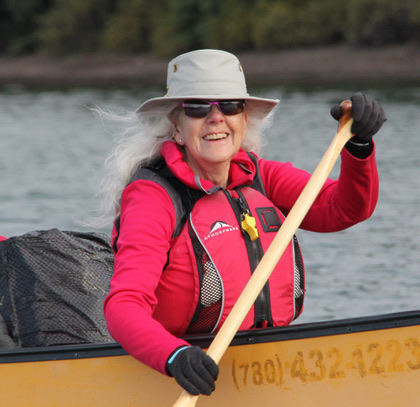Convocation Spotlight: Jane Hurly, PhD
21 November 2022

After a successful 40-year career in teaching, film and television — including a decade or so in professional communications with the Faculty of Kinesiology, Sport, and Recreation! — Jane Hurly is celebrating completing her PhD in what she calls “the grand finale to my working life.” Now that she’s finished her PhD, focused on the experience and meanings of leisure for African immigrant women in Canada, during the COVID-19 pandemic, she’s looking forward to some leisure time of her own, some travel, and yes — continued learning.
What are you most proud of from your time in the program?
I was proud to receive a Social Sciences and Humanities Research Council (SSHRC) Doctoral Fellowship to support my studies, and, of course I'm very proud of having attained this degree. I'm especially proud of having done so as a septuagenarian! Biggest accomplishment is to have authored a paper (with the incomparable Gordon Walker) in the Journal of Leisure Research that is listed in the top 15 most-read articles for that journal.
What was the biggest challenge you faced?
Doing my doctoral research in a pandemic. I had just passed my candidacy exams in February 2020 and was awaiting the final ethics approval from the Research Ethics Board when the COVID-19 pandemic was declared in March 2020. My ethics application was stopped as no in-person interviews were permitted because of the contagion. I had to completely revise my research proposal in accord with COVID-19 protocols and seek ethics approval again. In all I lost about six months, time I could have spent doing my research. That was followed by the almost insurmountable challenge of recruiting in a pandemic, and conducting interviews entirely in the virtual space. All of this was done when vaccines were not readily available and many people were experiencing job loss, financial difficulties, food insecurity — and of course the fear of infection and death that could ensue from the simplest of interactions or activities.
What initially drew you to this area of study?
It started with a hallway conversation with Gordon Walker, an expert (now professor emeritus) in the socio-psychological dimensions of leisure. I was the KSR faculty's communications strategist at the time and had the privilege of asking professors about their work so that I could write about it and promote it. Gordon shared his deep knowledge about leisure with me and I was intrigued! Though I took a different direction in studying leisure for my PhD — I chose a classical philosophical lens rather than a psychological one — my curiosity and thirst for more knowledge about leisure grew and grew. It hasn't been quenched yet.
What lessons will you take from pursuing a degree during the pandemic?
I have learned resilience, strength and resolve. Typically a doctoral degree is marked by multitudinous intellectual conversations, a parrying back and forth of viewpoints and arguments, arguing one's position and being open to the ideas of others; of sparkling and heated debate, sharing one's ideas and thoughts with others; building on knowledge shared. Having 'ah-ha' moments with fellow students. All of that was missing in the pandemic. In my bubble of one I researched and wrote. All the intellectual back-and-forth I so hankered for was stilled. The camaraderie of the academic journey had vanished, so I had to find my levee of resilience within. I also learned from the women participating in my study the true meaning of inner strength, marvelling at their fortitude and grit in the challenges of the pandemic. I was quite humbled by their Amazonian courage.
What comes next for you in your career?
I'm taking a gap year to travel, volunteer, publish articles from my dissertation, and attend one last leisure conference. I'm also writing funding grants for a couple of NGOs.
What advice would you give to a student thinking of entering postgraduate studies?
Think hard about what it is that you are passionate about, then pursue it relentlessly with vigour. Choose your doctoral supervisor wisely, as this person will be at your side for about six years, so it is essential to ensure it is someone in whom you can place your trust.